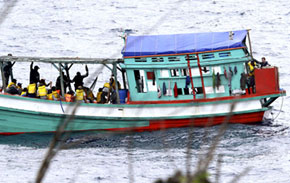 | ■ International
New wave of boat people
新一波船民
Forty years on, fleeing Vietnamese take to the seas again
四十年過後,外逃的越南人再次出海 |
| Nearly 40 years after hundreds of thousands of Vietnamese fled the country's Communist regime by boat, a growing number are taking to the water again. This year alone, 460 Vietnamese have arrived on Australian shores — more than in the last five years combined. The spike is drawing fresh scrutiny of Hanoi's human rights record, though Vietnam's flagging economy may also explain why migrants have been making the risky journey. | 近四十年前數以十萬計的越南人乘船出海逃避共產政權,現在又有愈來愈多的越南人乘槎浮於海。光是今年就有四百六十名越南人來到澳洲沿岸,這個數目比過去五年的總和還要多。這種外逃人數增加的情形,使人重新評估越南當局的人權紀錄,雖然越南低迷的經濟也許能夠解釋何以這些人鋌而走險,離鄉背井。 |
| Many Vietnamese who have reached Australia have been held incommunicado. Australia doesn't release details about their religion or place of origin within Vietnam, both of which might provide some hints about why they are seeking asylum. | 抵達澳洲的越南人中,很多都不能和外界接觸。澳洲政府並不公布他們信仰的宗教以及在越南的故鄉等資料,但這兩種資料卻可以透露一點他們何以尋求政治庇護的訊息。 |
| Truong Chi Liem, from the Villawood Immigration Detention Center on the outskirts of Sydney, would not reveal the details of his case, but said, "I'd rather die here than be forced back to Vietnam." He said Vietnamese simply looking to make more money shouldn't attempt a boat journey, but he also said, "If a person is faced with repression and threats by the authorities there, then they should leave." | 雪梨市郊維拉伍德移民拘留中心的林章志(音譯)拒絕透露他個人案子的詳情,但說:「假如我被迫返回越南,我寧可死在這裡。」他說,越南人假如只是想賺多一點錢,就不應該乘船出海。但他也說:「假如一個人遭到當局壓迫或威脅,那他就該離開。」 |
| In separate statements, the Australian and Vietnamese governments said the overwhelming majority or all of the arrivals were economic migrants, which would make them ineligible for asylum. Several Vietnamese community activists in Australia and lawyers who have represented asylum seekers dispute that categorization. | 澳洲和越南政府分別發表聲明說,抵境的人絕大多數是經濟流動人口,因此不符合政治庇護的資格。澳洲數位越南裔活躍分子和尋求政治庇護者的代表律師則質疑這種歸類方式。 |
| Those activists and lawyers have also raised concerns about what will become of the migrants, saying that while Australia doesn't want to keep them, Vietnam doesn't want to take them back. Asylum seekers are a sensitive issue for Vietnam because their journeys undermine Communist Party propaganda that all is well in the country. Vietnam remains a one-party state that arrests government critics. Human Rights Watch alleges torture in custody is routine. Most independent human rights activists say that repression has increased over the last two years. | 這些活躍分子和律師關注這些離鄉人的前途,他們說澳洲不願意收容他們,越南也不想讓他們返國。對於越南來說,尋求政治庇護的人是一個敏感議題,因為這破壞了越南共產黨關於國內形勢大好的宣傳。越南迄今仍是一個一黨專政的國家,批評政府的人是會遭到逮捕的。人權觀察組織宣稱,遭拘留的人受到虐待刑求是慣見的事。大部分立場超然的人權運動活躍分子宣稱,過去兩年間,打壓行動增加了。 |
| Little is known about the background of those that have made the trip this year. At least some of those who have arrived in the recent past are Roman Catholics. Others are said to be involved in land disputes with local authorities. "I don't think you can generalize, but there has been an increase in repression in Vietnam. The sentences are getting longer. There is more fear," said Hoi Trinh, an Australia lawyer of Vietnamese descent who heads an organization that helps asylum seekers. "If more people are more fearful, then more of them will flee." | 今年出走的人背景如何,外界所知不多。剛抵境不久的一批人中,至少有一些是天主教徒,另有一些則據說是和地方當局有土地紛爭的人。越南裔澳洲律師程海(音譯)也是一個義助政治庇護尋求者組織的負責人。他說:「我想我們不能一概而論,但越南國內的逼迫增加了,刑期變長了,恐懼進一步瀰漫。假如心懷畏懼的人增加了,他們之中要逃亡的人也會增加。」 |
沒有留言:
張貼留言